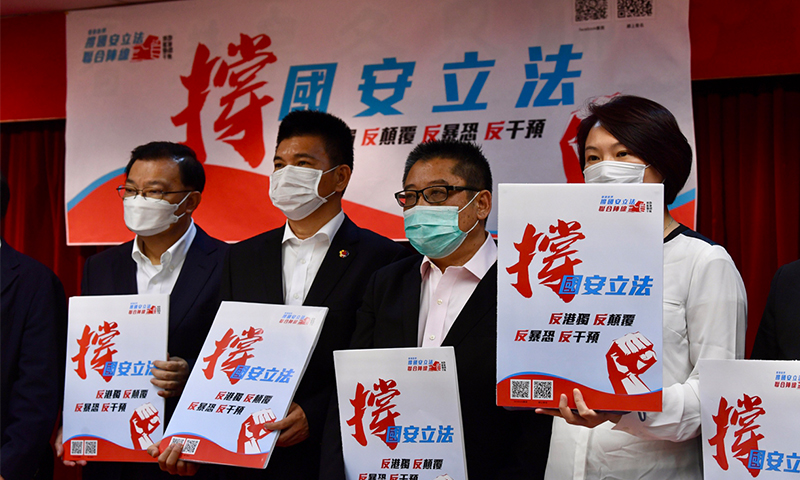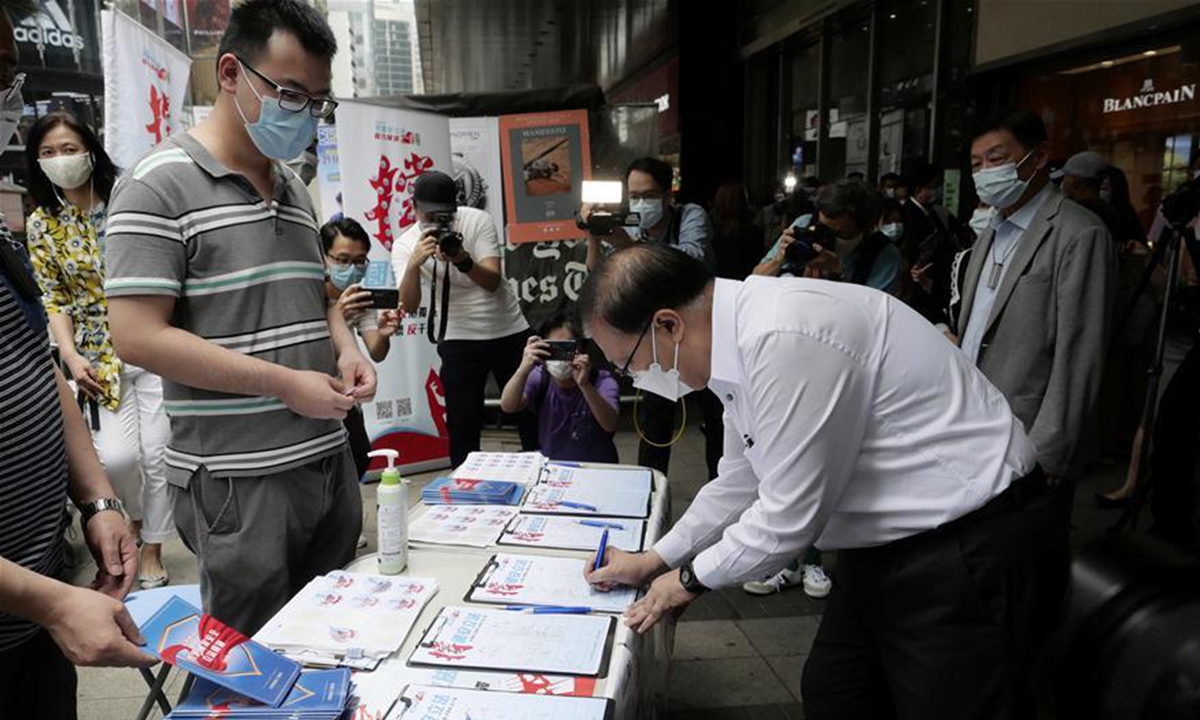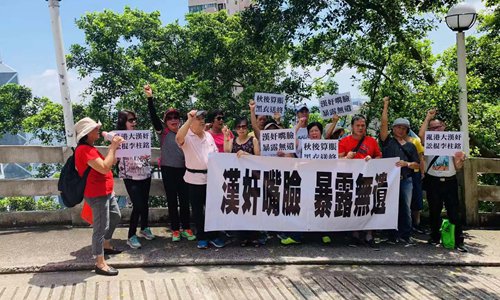Last year's turmoil will not repeat in HK: experts

The United Front Supporting National Security Legislation holds a press conference on Monday, saying that 2.92 million Hong Kong citizens have signed a petition in support of the proposed national security legislation. Photo: cnsphoto
Tuesday marked what some Hong Kong radical protesters hailed as the widely-anticipated first anniversary of the anti-extradition bill protests, with them eagerly trying to revive last year's "glory" when some 240,000 people took to the streets on June 9 last year. But the reality this year fell far short of their expectations with a much fewer number of people showing up in the "anniversary protests" that were expected to be staged simultaneously in seven districts across the city.
No sizable protests materializing on Tuesday were a result of the deterrent effect of the national security law for Hong Kong, and not just on Tuesday, last year's large scale riots will never be repeated again in Hong Kong after the implementation of the law, analysts said.
Some Hong Kong protesters called for lunchtime demonstrations to mark the anniversary on Tuesday, but no sizable assemblies materialized. As of Tuesday afternoon, only dozens of protesters turned on the flashlights of their cellphones, chanted slogans and held banners at the Landmark mall in Central. Some 20 people in a mall in Kowloon Bay chanted slogans then left.
This formed a sharp contrast with the protests on the same day last year when 240,000 people participated in a demonstration against the extradition bill for nearly 10 hours which almost paralyzed traffic on Hong Kong Island and then ended in violence at midnight in various major districts with mobs storming the steel barricades outside the Legislative Council. Panoramic pictures of the large number of crowds made the front page of both Hong Kong and international media.
A year later, more Hongkongers were able to see clearly what the one year of destruction has brought them, the political forces behind the chaos, foreign supporters and who really cares about Hong Kong and Hongkongers the most. Most Hong Kong people, who just want life to return to normal, wouldn't support such protests, an expert said.
"Many opposition forces and radical protesters were fearful after the National People's Congress adopted the decision to draft the Hong Kong national security law, and they feared that the retroactive date of the law may cover what they did today," Kennedy Wong Ying-ho, solicitor of the Supreme Court of Hong Kong, told the Global Times on Tuesday.

Tam Yiu-chung, a member of the National People's Congress Standing Committee, signs a petition in support of the national security legislation at a street stand in Hong Kong, south China, May 29, 2020. (Xinhua/Wang Shen)
According to international conventions, if the suspect is convicted of one of the four criminal acts - secession, subversion, terrorist activities and acts interfering in Hong Kong's internal affairs aiding foreign or external forces - they will face severe punishment. In the US, such activities could face imprisonment up to 40 years, Wong said.
The anti-extradition bill protests in Hong Kong last year turned extremely violent, transforming the Asian financial hub into an undeveloped city engulfed in turmoil. Stores and subway stations were vandalized, roads were blocked, fire was set everywhere and innocent people were attacked and burned. Students were even prevented from attending class.
Due to the chaos, Hong Kong fell sharply in global rankings, and its economy shrank by 8.9 percent year on year in the first quarter this year marking its worst drop since records began in 1974.
All of this has resulted in what Zhang Xiaoming, deputy director of the Hong Kong and Macao Affairs Office of the State Council, described on Monday, saying it's "the most tense situation in Hong Kong since its return in 1997."
The central government was forced to take action, in face of Hong Kong opposition parties and radical separatists, who have misinterpreted the restraint and tolerance of the central and SAR governments as weakness, and have gone too far, Zhang said at an online symposium of the HKSAR government to mark the 30th anniversary of the Basic Law.
The national security law with its deterrence will ensure that last year's turmoil will not happen again in Hong Kong, Wong said.
Drawing Lessons
Experts said that one year after the turmoil, both Hong Kong and the central government have to reflect on the past year and plug the exposed loopholes.
Hong Kong Chief Executive Carrie Lam said on Tuesday that everyone, including herself and members of the Legislative Council, must draw lessons as Hong Kong has gone through many difficulties and serious events in the past year.
She said that Hong Kong cannot afford more chaos, and that Hong Kong people want a stable environment and happy normal lives, especially in the face of the global economic recession caused by the COVID-19 pandemic.
Zheng Yongnian, a professor at the East Asian Institute of the National University of Singapore, said that Hong Kong needs to "return to China for a second time," and problems are prominent in Hong Kong's governance and the will of the people.
Zhang said that Hong Kong's main problems don't lie in people's livelihoods or the economy, but politics. On the fundamental question of what kind of Hong Kong we should build, there are serious differences and even clashes. He admitted that we have encountered roadblocks and challenges in implementing the "one country, two systems," including limitations of the top level system design and deficiencies in practical work.
Li Xiaobing, an expert on Hong Kong, Macao and Taiwan studies at Nankai University in Tianjin, told the Global Times on Tuesday that the key factor is that the HKSAR government has to realize the importance of governance and explore the principle of "one country, two systems."
"When encountering certain difficulties that autonomy cannot solve, the Hong Kong government has to accept the central government's governance," Li said, while refuting claims that the central government will suppress Hong Kong in doing so as the Hong Kong people have seen clearly that the central government really cares about them.
Last year's months-long, extremely violent protests attracted international attention mainly because of the interference of foreign forces as well as the collusion between Hong Kong and Taiwan secessionists, Wong said.
The central government has pointed out clearly the legal vacuum exposed by the turmoil and decided to draft the national security law to severely punish those who collude with foreign forces to undermine national security.
Even opposition forces have begun to soften their rhetoric against the legislation on Article 23 of the Basic Law which allows the HKSAR government to improve its legal system when safeguarding national security.
One of Hong Kong's leading separatists, even regarded as a traitor by Chinese, Martin Lee Chu-ming said on Sunday that democrat groups will back Article 23 as long as it does not harm "human rights and freedom," and also tried to distance himself from Hong Kong secessionists in an interview with Hong Kong media.
Tian Feilong, a Hong Kong affairs expert and associate professor at Beihang University in Beijing, told the Global Times on Tuesday that pan-democratic groups have to rethink their relationship with foreign interference forces under the national security law.

Citizens protest outside of Martin Lee Chu-ming's residence in Hong Kong on July 13. Lee reportedly keeps close contact with the NED. Photo: Fu Guohao/GT
Future of the'one country, two systems'
Zhang said that national security legislation for Hong Kong ensures the "one country, two systems" goes further, and how Hong Kong people behave now would affect the territory's post-2047 status.
"I have noticed many people in Hong Kong are looking ahead to the fate of the 'one country, two systems' after 2047. We really need to consider: What kind of records will Hong Kong present to the nation's top legislature at that time and the people of the whole country it represents, for a new mandate?"Zhang said.
Experts noted that Hong Kong's government needs to deepen cooperation with the central government in sectors such as education and civil servant management to better continue the "one country, two systems."
Analysts have called on Hong Kong to establish a new educational system to fit into the "one country, two systems," and several Hong Kong education officials said a comprehensive review of Hong Kong's education and assessment system was being undertaken to set things right under the principle of "one country, two systems."
On Monday, Secretary for the Civil Service in Hong Kong Patrick Nip Tak-kuen said under the "one country, two systems," civil servants of Hong Kong are also civil servants of the country, and they cannot solely focus on Hong Kong alone in policy considerations, nor should they hold a hostile attitude toward the rest of the country, Hong Kong media reported.
Li said that the "one country, two systems" needs a transition in order to maintain the principle even after 2047.
The principle has to shift its focus from reunification to regional governance and the separated management between Hong Kong and the Chinese mainland has to change into better integration on the development of people's livelihoods and the economy, Li said.